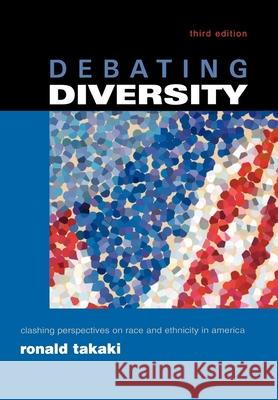Debating Diversity: Clashing Perspectives on Race and Ethnicity in America » książka
Debating Diversity: Clashing Perspectives on Race and Ethnicity in America
ISBN-13: 9780195146516 / Angielski / Miękka / 2002 / 272 str.
In the nineteenth century Herman Melville wrote, "America was settled by peoples of all nations....You cannot spill a drop of American blood without spilling the blood of the whole world. We are not a narrow tribe." At the beginning of the twenty-first century, America is more ethnically diverse than ever before. Will we fear this expanding diversity as the disuniting of America, or will we embrace a more inclusive re-definition of our national identity?
As the nation's preeminent scholar of multicultural studies, Ronald Takaki invites us to address this question by "debating diversity." The overarching theme of his new anthology is the clash of perspectives over the master narrative of American history--the powerful but mistaken story that this country was settled by European immigrants and that Americans are white.
The collection opens with the lively intellectual exchange between Nathan Glazer and Ronald Takaki on ethnicity versus race; it then turns to the contrasting interpretations of the frontier by Frederick Jackson Turner and Takaki. Other debates include: Samuel P. Huntington and Elizabeth Martinez on the diversity of civilizations; Irving Kristol and William Julius Wilson on inner-city blacks; Robert J. Samuelson and Gregory Defreitas on Mexican immigration; Governor Pete Wilson and Chancellor Chang-lin Tien on affirmative action; and James Q. Wilson and Elliott Currie on crime and punishment. The anthology closes with a debate between Arthur Schlesinger, Jr., and Takaki on whether we as Americans should pursue a vision of our society as a melting pot or as a multicultural democracy. Embedded in all of the essays is the question: "Originating from different shores, can we become one people of the United States of America?" An ideal text for diversity courses in Ethnic Studies, Political Science, American Studies, History, Sociology, Anthropology, and Education, Debating Diversity will stir students to think critically about who we have been and who we are as Americans.
"











